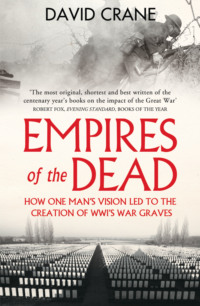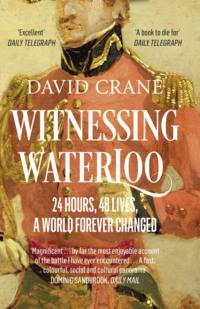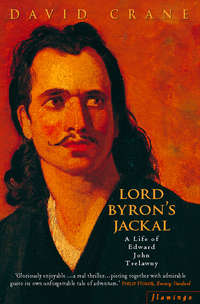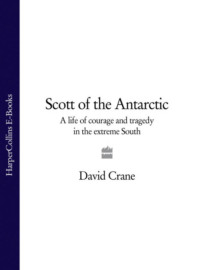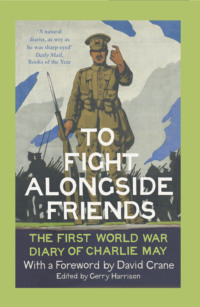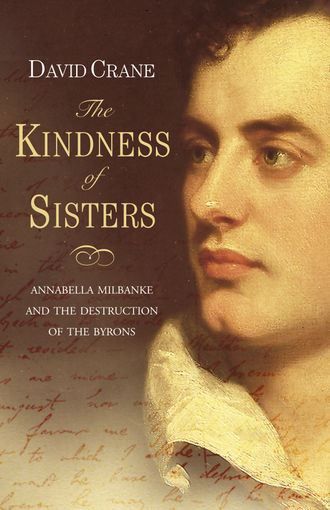
Полная версия
The Kindness of Sisters: Annabella Milbanke and the Destruction of the Byrons
I have an invitation for you – There will be the Stael – some people whom you know – & me whom you do not know & you can talk to which you please – & I will watch over you as if you were unmarried & in danger of always being so … I think our being together before 3d. people will be a new sensation to both.65
With anyone except Augusta this might have led nowhere, but with her chronic habit of subservience, it was only a matter of time before affection and familiarity slid into something more perilous. It is impossible to know with any absolute certainty when brother and sister became lovers, but if the malicious gossip of Caroline Lamb – or Byron’s own boast to Tom Moore that her seduction had cost him little trouble – has any substance it was probably only a matter of weeks or even days.
The mere use of the word ‘seduction’ in this context however – Byron at his coarsest – wilfully trivialises and misrepresents a relationship that he would always more honestly recognise as the most important of his life. If these things can ever be judged from the outside, it would seem that sex was always of secondary significance in their affair, on Augusta’s side to a limitless capacity for self-surrender, and on Byron’s to the expression of a kindness and generosity that was at the core of his personality.
And yet when that is said, his letters and verse make it clear that he inspired in the twenty-nine-year-old mother of three a passion that surprised them both with its violence and abandon. In the best known celebrations of their love it is always a platonic ideal of union that Byron is anxious to stress, but in Zuleika’s language in The Bride of Abydos we are almost certainly taken closer to the earthier reality of its early days. ‘To see thee, hear thee, near thee stay,’ Zuleika tells the man she believes to be her brother, in a passage which unconsciously echoes the startled self-discovery of Shakespeare’s Perdita in the great fourth act of A Winter’s Tale
And hate the night I know not why,
Save that we meet not but by day,
With thee to live, with thee to die,
I dare not my hope deny:
Thy cheek, thine eyes, thy lips to kiss,
Like this – and this – no more than this;
For, Allah! Sure thy lips are flame:
What fever in thy veins is flushing?
My own have nearly caught the same,
At least I feel my cheek, too, blushing.66
Even when this is recognised, however, the seamless, almost inevitable transition from sister to lover was for Augusta only one stage in a more complete annihilation of self. ‘Partager tous vos sentiments,’ she wrote to him in November 1813, enclosing with the note a lock of her hair: ‘Ne voir que par vos yeux’ – ‘to share in your feelings, to see only with your eyes, to act only on your advice, to live only for you, that is my only desire, my plan, the only destiny that could make me happy.’67 ‘To soothe thy sickness,’ Zuleika continues in the same vein in the Bride,
watch thy health,
Partake, but never waste thy wealth,
Or stand with smiles unmurmuring by,
And lighten half thy poverty;
Do all but close thy dying eye,
For that I could not live to try;
For these alone my thoughts aspire:
More can I do, or thou require?68
The tragedy for Augusta, however, was that Byron did require more, because for him the affair was more complex and guilt-ridden than her simple devotion could comprehend. In reckless moments he might publicly ridicule the moral parochialism of an incest taboo, but at other times it could disturb him with a fear that stopped him naming Augusta even in the privacy of his journal. ‘Dear sacred name, rest ever unreveal’d,’ he quoted from Pope’s Eloisa in his November 1813 journal, adding his own gloss: ‘At least even here, my hand would tremble to write it.’69
Somewhere behind this fear lies the legacy of his Calvinist childhood, and yet as his deathbed shows, Byron was too intellectually and morally courageous to be cowed by the demons of the ‘Scotch School’. Throughout his life he habitually dramatised himself in terms of Miltonic defiance, but for all the swagger of Cain or Heaven and Earth, Byron’s sense of sin and exclusion was ultimately bound by this world rather than the next, his instinct for rebellion against man and not against God.
And this is perhaps the key to his behaviour with Augusta, because the fear he had of what they had done was less to do with a theological sense of sin than the growing recognition that he was prepared to push his defiance of convention to any limits. In his affair with Caroline Lamb the previous year, the courage or recklessness had seemed almost exclusively hers, but as he paraded Augusta in London and followed her to Newmarket and talked of exile together, as he trailed the affair in his letters and flaunted their incest in his poetry – as he pitted the Byrons against the world in the most public and symbolic way he could find – he discovered in Augusta not just his ideal refuge but his perfect weapon.
It would take the imaginative sympathy of a novelist to do justice to the complex and contradictory rhythms of Byron’s life as it slid towards open rupture with the society that had embraced him only eighteen months earlier. If one simply believed the evidence of his journal for the winter of 1813–14, the frustrations of the previous year were as acute as ever, but as one turns from that to his verse, the contrasting boldness of the poetry suggests rather an artist and man growing into a defiant sense of his own power and vocation.
In the space of a few days in November 1813 he wrote The Bride of Abydos, and the following month, in another spasm of creative energy, threw off the third of his Eastern tales, The Corsair. In his letters and journals he was as dismissive as one would expect of these achievements, and yet no amount of Byronic self-mockery or defensive irony could deflect the central importance these poems had for him.
The Bride of Abydos, written with Augusta and the theme of incest constantly in mind, had been, in his own words, his first ‘complete’ poem but in its own harsher way The Corsair was every bit as subversive. He had written the Bride in the first place to keep himself sane, but with its violent and antisocial rage The Corsair was in itself a kind of deliberate public madness, brilliantly conceived simultaneously to alienate and seduce his public. ‘Fear’d, shunn’d, belied, ere youth had lost her force,’ Byron described his hero whom he must have known by now his readers would associate with himself.
He hated man too much to feel remorse,
And thought the voice of wrath a sacred call,
To pay the injuries of some on all.
He knew himself a villain – but he deem’d
The rest no better than the thing he seem’d;
And scorn’d the best as hypocrites who hid
Those deeds the bolder spirits plainly did.
He knew himself detested, but he knew
The hearts that loath’d him, crouch’d and dreaded too.
Lone, wild, and strange, he stood alike exempt
From all affection and from all contempt:
His name could sadden, and his acts surprise;
But they that fear’d him dared not to despise:
Man spurns the worm, but pauses ere he wake
The slumbering venom of the folded snake:
The first may turn, but not avenge the blow;
The last expires, but leaves no living foe;
Fast to the doom’d offender’s form it clings,
And he may crush – not conquer – still it stings!70
‘I have just finished the Corsair – am in the greatest admiration’, Annabella Milbanke, wilting forgotten in the wings since her rejection of Byron’s proposal, wrote to Lady Melbourne,
In knowledge of the human heart & its most secret workings surely he may without exaggeration be compared to Shakespeare. He gives such wonderful life & individuality to character that from that cause, as well as from unjust prepossessions of his own disposition, the idea that he represents himself in his heroes may be partly accounted for. It is difficult to believe that he could have known these beings so thoroughly but from introspection … I am afraid the compliment to his poetry will not repay him for the injury to his character.71
For a brief period in the autumn of 1813 – probably to placate Lady Melbourne – Byron did his best to draw back from the edge with his pursuit of the young, newly married Lady Frances Webster, but by the end of the year Augusta was pregnant with a child which the dates suggested might well be his. In the middle of the following January, with a crisis mounting, brother and sister drove north to Newstead, ‘through more snows than ever opposed the Emperor’s retreat.’ Once arrived, there was no possibility of leaving. The roads beyond the Abbey were impassable, but their coals were excellent, he told his publisher, John Murray, the fireplaces large, the cellar full, his head empty, his only desire ‘to shut my doors & let my beard grow.’72
For the moment, defiance and refuge were in perfect equilibrium. ‘Never was such weather’, Byron wrote contentedly after ten days, ‘one would imagine Heaven wanted to raise a Powder-tax & had sent the snow to lay it on.’73 Never had his ancestral home seemed so all-sufficient as with Augusta. ‘And what unto them is the world beside,’ Byron later demanded in Parisina, his drama of incest and family doom that echoes the mood of these weeks,
With all its change of time and tide
Its living things, its earth and sky,
Are nothing to their mind and eye.
And heedless as the dead are they
Of aught around, above, beneath;
As if all else had pass’d away
They only for each other breathe …
Of guilt, of peril, do they deem
In that tumultuous dream?74
There is something, in fact, of the magic of Pasternak’s Dr Zhivago about Byron’s and Augusta’s illicit exile at Newstead, isolated from criticism and responsibilities by the impenetrable winter landscape, as safe among the ruins of the abbey as Yuri and Lara in the frozen wastes of Varykino. At the edge of Newstead’s cloistered world lurked the wolves, but like Zhivago watching their shadows in the half-light of dusk, Byron could pretend for the moment that they were merely dogs. To be alive, and to live in the present, was enough. All his restless search after sensation was sunk in ‘sluggish’ content. Even the desire or need to write – for Byron the ‘lava of the imagination’75 – was gone. Happy, he had neither need nor urge to create. He felt, he told Murray in a revealing metaphor for his poetic life, as he did when recovering from fever in Patras – ‘weak but in health and only afraid of a relapse.’ ‘I shall keep this resolution’, he wrote of his determination to give up scribbling, ‘for since I left London – though shut up – snowbound – thawbound – & tempted with all kinds of paper – the dirtiest of ink – and the bluntest of pens – I have not even been haunted by a wish to put them to their combined uses.’76
The wolves, though, were not dogs, and with the Tory press in full voice following the publication of his poetic squib against the Prince of Wales, Caroline Lamb still primed for trouble and his friends increasingly nervous, Byron was never going to be allowed to forget it. Characteristically, just as the previous year Caroline’s antics had frightened him back from the abyss, his moods now swung between defiance and compromise, between talk of the exile he had been threatening for almost a year and a marriage – any marriage – that might yet be his ‘salvation’ from the feelings that he confessed to Lady Melbourne ‘are a mixture of good and diabolical’77.
After his first impetuous talk of exile, Augusta too was beginning to look on the idea as the only way of averting catastrophe. There is little doubt that she would have gone abroad with him the previous summer if he had pressed her, but in the nature of things she had more to lose than he did and for a mother as indulgently devoted as Augusta, the thought of abandoning any of her children – Georgiana, her eldest, had been born in the first week of November 1808, Augusta Charlotte, a little over two years later and a son, George, in June the next year – could never have been a bearable option.
George was still only a baby when Byron first proposed exile to Augusta, however, and it was probably her two daughters who most exercised her concern. From an early age Augusta Charlotte had begun to exhibit the symptoms of autism that would eventually lead her to an asylum in Kensal Green, and yet in her different way the oldest, ‘Georgey’ – traditionally Byron’s favourite – was as much of a worry as her sister, constantly ill and as cripplingly and elusively shy as Augusta herself had been as a child.
And even with Augusta’s easy belief in the workings of a benevolent providence – virtually the only legacy from her pious Holderness grandmother – she must have felt that she had used up not just her small stock of courage but her luck when the birth of a third daughter in April passed without any gossip. It is impossible to tell from the few elliptical comments in Byron’s letters how anxious they had been in advance, but whatever his thoughts on the child he was certainly concerned enough for Augusta to journey up from London to the Leighs’ home outside Newmarket in the days before her confinement.
For all the space and time that has been expended on the subject, the only thing that can be said with any certainty of the paternity of Elizabeth Medora Leigh, is that it cannot be known. It would seem likely that Byron and Augusta both initially believed that she was his child, and yet there is not a single scrap of evidence – not a remark or silence – that cannot be equally well interpreted to support either side of the argument. ‘Oh! but it is worth while’, Byron reported to Lady Melbourne – in the one notorious, throw-off paragraph on which a whole speculative industry has been raised,
I can’t tell you why – and it is not an ‘Ape’ [an apparent reference to medieval incest superstitions] and if it is – that must be my fault – however I will positively reform – you must however allow – that it is utterly impossible I can ever be half as well liked elsewhere – and I have been all my life trying to make someone love me – & never got the sort I preferred before. But positively she and I will grow good – and all that – & so we are now and shall be these three weeks & more too.78
For all Byron’s resolutions, however, the choice of the name Medora – the heroine of his Corsair – smacks of the kind of brinkmanship that threatened disaster at any moment. It has been argued, with some plausibility, that she was in fact called after the Oaks winning filly of 1813, but even if that is true Augusta – for all her ‘goosiness’ – was astute enough to know that in anything to do with Byron it was the perception rather than the reality of things that mattered.
She had, in fact, her own idea for Byron’s wife, Lady Charlotte Leveson-Gower, but since the previous autumn an alarmed Lady Melbourne had been keeping a far more serious candidate waiting in the wings. For a time during his Eywood idyll there had been a slight froideur between her and Byron, but one of the great secrets of Lady Melbourne’s influence was a talent for absorbing slights and from the first threatening appearance of Augusta in Byron’s life she had been as ready to sacrifice her niece for his safety as she had been a year earlier for her own dynastic needs.
There are moments in the relationship of Byron and Annabella Milbanke that tilt the sympathies violently in one direction or another and the intervention of Lady Melbourne is one of these. There is no need to sentimentalise the broadly ‘Austenish’attitudes to marriage of Annabella herself, but the machinations of her aunt over the next fifteen months belong to another league altogether, raising the cynicism of the Regency marriage market to levels for which Glenarvon or Les Liaisons Dangereuses – the constant point of reference among her family for Lady Melbourne – provide no real preparation.
Lady Melbourne’s letters to Byron were always cooler, more discreetly circumspect, than his to her, and so it is difficult to be sure of her motives in this matter. It is clear that she was both genuinely fond of Byron and alarmed for him, but for a woman who only had to see a happy marriage, it was said, to want to destroy it, the appeal of the match must have been as much aesthetic as practical – the pure unalloyed pleasure of uniting two people so symmetrically ill-suited as Annabella and Byron, ‘the spoilt child of seclusion, restraint and parental idolatry’ and ‘the spoilt child of genius, passion, and the world,’79 as Mrs Stowe later described them.
Lady Melbourne’s performance was one of dazzling cynicism as she brought them together again, interpreting one to the other, revealing or concealing as needed, playing equally on the weaknesses of Byron and Annabella until each imagined the initiative their own. There was a streak of passivity in Byron’s nature that had always made him putty in Lady Melbourne’s hands, but with her romantic high-mindedness and naivety her niece proved no less easy to manage.
After almost a year in which she had time to reflect on the loneliness of moral superiority and the dullness of domestic life without the frisson of Byron’s attentions, Annabella was ripe for persuasion. ‘I have received from Lady Melbourne an assurance of the satisfaction you feel in being remembered with interest by me,’ her first direct letter to him had begun on cue on 22 August 1813 – midway between the beginning of his affair with Augusta and his half-hearted pursuit of Lady Frances Webster,
Let me fully explain this interest, with the hope that the consciousness of possessing a friend whom neither Time nor Absence can estrange may impart some soothing feeling to your retrospective views.80
One of the supreme temptations of the novel, E.M. Forster once confessed, is the desire to give characters the happiness that ‘real life’ denies them, and this first letter of Annabella’s can stir the same kind of emotions. She was so much in the habit of regarding herself in fictional terms that it would be hard not to follow suit anyway, but the cruelty of her fate now was to find herself less the heroine of her own shaping than the dupe of a Leclos plot over which she had no control. ‘You have remarked the serenity of my countenance,’ she went on,
but mine is not the serenity of one who is a stranger to care, nor are the prospects of my future untroubled. It is my nature to feel long, deeply, and secretly, and the strongest affections of my heart are without hope. I disclose to you what I conceal even from those who have most claim to my confidence, because it will be the surest basis of that unreserved friendship which I wish to establish between us … Early in our acquaintance, when I was far from supposing myself preferred by you, I studied your character. I felt for you, and I often felt with you. You were, as I conceived, in a desolate position, surrounded by admirers who could not value you, and by friends to whom you were not dear. You were either flattered or persecuted. How often have I wished that the State of Society would have allowed me to offer you my sentiments without restraint.81
With its oblique and frustrated demand to be heard this might anticipate the great climax of Persuasion, but Annabella was no more an Anne Elliot than Byron was Captain Wentworth. From her earliest youth she had dramatised herself as the self-sacrificing heroine of her historical daydreams, and the girl who had stood by Howard in her fantasies now abandoned herself to the role of Byron’s redeemer, uniting herself with him in an imaginary communion of souls that transcended time, place or vulgar self-interest. ‘Surely the Heaven-born genius without Heavenly grace must make a Christian clasp the blessing with greater reverence & love, mingled with a sorrow as a Christian that it is not shared’, she wrote to her old confidante Lady Gosford in her most ecstatic vein,
Should it ever happen that he & I ever offer up a heartfelt worship together – I mean in a sacred spot – my worship will then be most worthy of the spirit to whom it ascends. It will glow with all the devout and grateful joy which mortal breast can contain. It is a thought too dear to be indulged – not dear for his sake, but for the sake of man, my brother man, whomever he be – & for any poor, unknown tenant of this earth I believe I should feel the same. It is not the poet – it is the immortal soul lost or saved.82
In one of her ‘Auto-descriptions,’ Annabella confessed this inability to distinguish fiction from fact, but what had been harmless enough in the child was profoundly dangerous in the adult. In the early days of their acquaintance she had self-consciously distanced herself from the ‘Byromania’ of London, but as she realised with something like panic how much she had lost in turning him down, she set about desperately trying to recreate Byron in an image she could square with her conscience, blindly moving with every exchange of letters towards marriage with a man she scarcely knew. ‘I entreat you then to observe the more consistent principles of unwearied benevolence’, she wrote to Byron in the language of a tabloid astrologer,
No longer suffer yourself to be the slave of the moment, nor trust your noble impulses to the chances of Life. Have an object that will permanently occupy your feelings & exercise your reason. Do good. Your powers peculiarly qualify you for performing those duties with success, and may you experience the sacred pleasure of having them dwell in your heart!83
It is clear from Byron’s reply that Annabella’s tone had startled him, but if he had to sacrifice Augusta, it hardly seemed to matter whom he married. ‘To the part of your letter regarding myself’, he wrote back, having first assured her that she was the only person with whom he had ever contemplated marriage,
I could say much – but I must be brief – if you hear ill of me it is probably not untrue though perhaps exaggerated – on any point in which you may honour me with an interest I shall be glad to satisfy you – to confess the truth or refute the calumny. – I must be candid with you on the score of Friendship – it is a feeling towards you with which I cannot trust myself – I doubt whether I could help loving you – 84
There was not a scrap of hypocrisy about Byron, but what was almost as hazardous as he renewed his interest in Lady Melbourne’s niece, was the artist’s ability to conjure imagined feeling out of the depths of genuine experience. He would have found it impossible to preserve his illusions about a future with Anna-bella had he seen anything of her, but in the safety of letters he could indulge in an emotional transfer that enabled him to create an idea of her and himself that could sustain him through the travesty of an epistolary courtship.
If it was a serious error of judgement on Annabella’s part to imagine she could reform Byron, it was a more culpable misjudgement on his to think that he would ever allow it. It is unlikely that with Augusta so compulsively in his mind anyone could have filled her place, but as he edged inexorably towards a second proposal, it was Annabella’s fate to be almost diagrammatically the wrong person at the wrong time – a poor woman’s Dorothea Brooke, capable of change but not growth, of ardour but not compassion, sensibility but no real sympathy.
It is possible still that Byron could have forgiven Annabella for what she was, and yet he must have known, as he finally steeled himself to propose, that he could never forgive her for not being Augusta. In the early days of their courtship her virtues had been thrown into relief by the extravagances of Caroline Lamb, but seen now through the distorting prism of his ‘perverse passion’85 everything about her would inevitably come to seem different, her goodness primness, her certainties dogmatism, and her learning pedantry – the five foot three incarnation of all the cultural and moral littleness he despised.


